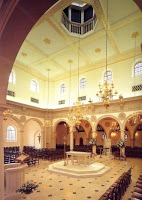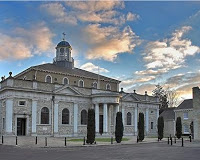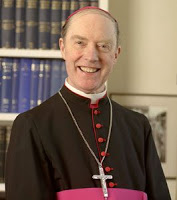
Andrew Wright, Director of Music for the Cathedral and Diocese of Brentwood in the UK, leads the way in restoring Gregorian Chant to its rightful place in the Liturgy.
Until more recent times, Chant featured rarely in the liturgies of Brentwood Cathedral. Typical examples of its use would be the better-known Chant settings of the Ordinary, and the occasions for performance would principally have been the Sunday Choral Mass for the Cathedral/Parish. However, some Chant would be used for diocesan liturgies like the Mass of Chrism. Other examples of the occasional use of Chant would be Credo III, Pater Noster, Victimae Paschali, Veni Sancte and hymns such as the Veni Creator. Some Chant was also used for monthly Sunday Vespers, e.g Psalm 109 – either on its own or in conjunction with polyphony – and the occasional vespers hymn. In terms of the overall scheme of music at the Cathedral, the chant maintained some kind of balance with other forms of music but its role was fairly minimal.
 Over the past four years, however, Andrew Wright, Brentwood Cathedral and Diocese’s illustrious Director of Music, has instigated a dramatic increase in the amount and frequency of Chant used at Cathedral liturgies. At the Sunday 11.30 Choral Mass he has extended the Chant to include an Introit, the Communion Antiphon is used every Sunday (at the start of Communion, followed by a motet), and the number of Chant Masses in regular use has been extended (for the Kyrie, Sanctus, Agnus Dei). Current plans include the introduction of Gloria XV and the proper Alleluia. The role of the Chant at Vespers has also been dramatically increased and the Psalms and Antiphons are now regularly chanted in Latin to the proper tones.
Over the past four years, however, Andrew Wright, Brentwood Cathedral and Diocese’s illustrious Director of Music, has instigated a dramatic increase in the amount and frequency of Chant used at Cathedral liturgies. At the Sunday 11.30 Choral Mass he has extended the Chant to include an Introit, the Communion Antiphon is used every Sunday (at the start of Communion, followed by a motet), and the number of Chant Masses in regular use has been extended (for the Kyrie, Sanctus, Agnus Dei). Current plans include the introduction of Gloria XV and the proper Alleluia. The role of the Chant at Vespers has also been dramatically increased and the Psalms and Antiphons are now regularly chanted in Latin to the proper tones.
Andrew claims that the ability of the Cathedral Choir to perform the chant better has been a factor for its increase. He is also aware of a desire to help restore this most fundamental liturgical music of the Roman Catholic Church. “The congregation here is used to a great variety of music and I believe their listening experience has help lead to a greater appreciation of chant. We have also successfully demonstrated that repeating the chant, for example the Sanctus or Gloria VIII regularly on Sundays, gradually builds up the congregational singing and appreciation. The music of course stands much repetition and it’s very sound and construction is a product of its regular prayerful purpose. It is also music which is dispassionate and unifying and therefore good for the liturgy.”
He continues “people are increasingly conscious of the need for greater beauty and the numinous in much of our liturgical music, not least in terms of prayerfulness and deeper spirituality etc. People are more aware today of Chant in terms of art, its history and role and that it must not be lost from the liturgy. Having experienced any other forms of music people can evaluate this today better and more sensibly. However, it is important that any efforts to re-introduce chant are done sensitively and pastorally as not to do so can be counter-productive and have the opposite effect.”
“It is important to help people understand that the continued use of the traditional music of the church can find a home within the present day liturgy very successfully. Perhaps this would be true of most venues although in other venues the need and capacity to use much larger amount of chant can and does work depending on the liturgy and ritual employed. In more general venues it helps to introduce Chant with/through young choristers singing.”
 Andrew has met with a very favourable response to the reintroduction of Chant in the Cathedral and a good number of the faithful have commented in particular about its beauty and prayerfulness. I have been privileged to conduct two workshops for Andrew at Brentwood Cathedral, the first for the Cathedral Choir, the second for the Diocese, and on both occasions I was struck by the wonderful welcome I received, and by the receptiveness of the people who, without exception, have open minds and hearts, and a hunger for prayerful music, the beauty of the Chant and the Sacred Liturgy. I am looking forward to my third visit to the Diocese in the Autumn for a Chant Workshop in conjunction with the local Anglican diocese, with which Brentwood enjoys particularly close ecumenical ties. I feel very honoured to have been asked again by Andrew to participate in some small way in the wonderful work he does in the Cathedral and throughout his diocese, of which he is also the Director of Music.
Andrew has met with a very favourable response to the reintroduction of Chant in the Cathedral and a good number of the faithful have commented in particular about its beauty and prayerfulness. I have been privileged to conduct two workshops for Andrew at Brentwood Cathedral, the first for the Cathedral Choir, the second for the Diocese, and on both occasions I was struck by the wonderful welcome I received, and by the receptiveness of the people who, without exception, have open minds and hearts, and a hunger for prayerful music, the beauty of the Chant and the Sacred Liturgy. I am looking forward to my third visit to the Diocese in the Autumn for a Chant Workshop in conjunction with the local Anglican diocese, with which Brentwood enjoys particularly close ecumenical ties. I feel very honoured to have been asked again by Andrew to participate in some small way in the wonderful work he does in the Cathedral and throughout his diocese, of which he is also the Director of Music.
 Andrew speaks of an awareness of what has been lost, musically, from the tradition of the Church, but also an awareness that the Holy Father has been encouraging us to look again and value our intrinsic musical heritage, and there is a real and increasing willingness to support this concern and contribute to its well-being. I know from my visits to this beautiful Cathedral Church, and from my many conversations with Andrew, that the Chant has once more found a home in the liturgy at Brentwood Cathedral, and that its use will continue to grow and flourish there under the inspired leadership of their wonderfully talented, forward-looking and inspirational Director of Music, for whom I have the utmost respect and admiration.
Andrew speaks of an awareness of what has been lost, musically, from the tradition of the Church, but also an awareness that the Holy Father has been encouraging us to look again and value our intrinsic musical heritage, and there is a real and increasing willingness to support this concern and contribute to its well-being. I know from my visits to this beautiful Cathedral Church, and from my many conversations with Andrew, that the Chant has once more found a home in the liturgy at Brentwood Cathedral, and that its use will continue to grow and flourish there under the inspired leadership of their wonderfully talented, forward-looking and inspirational Director of Music, for whom I have the utmost respect and admiration.
Please pray for Andrew Wright, for his hugely-supportive new Cathedral Dean, Fr Martin Boland, and his equally supportive and visionary Ordinary, Bishop Thomas, who has done so much to promote and encourage music in Brentwood. Please pray too for the Choir and people of the Cathedral and for the Diocese as they continue, under Andrew’s leadership and direction, in their wonderful work of restoring the Chant and lifting the hearts and minds of the faithful to God through music.
Qui bene cantat bis orat!

Do the people sing the psalms? If so, I applaud his efforts. If not, then he is usurping the rightful role of the assembly as the Roman Missal provides.
They do indeed – and with gusto!
Which does he utilize and find more effective: people on the psalm verses and choir on the antiphon, or vice versa?
Oh, Todd, if I didn't know better I'd suspect you of paranoia. As one old Beardie to another: chill!
It's a curious question, and one on which I'm always interested to know where my colleagues stand. I'm sure Nick can speak for himself on the question, or better yet, Andrew Wright.
I'm afraid I can't answer that one. I am sure Andrew will see this article and add a comment in due course.
Since Ian's comment veered the thread into something less about Andrew and more about my "paranoia," I will mention that I find both practices laudable.
For an advanced Gregorian antiphon, especially one (in Latin) for less-advanced congregations, I like the option of having the people chant the psalm to a simple tone, possibly even alternating one side and the other.
Other communities are more used to the Gregorian antiphons, or even the simple vernacular ones in a collection like BFW. It's more customary in the US for assemblies to sing "refrains," so this option of leaving psalm verses for the choir would seem closer to the usual practice–as well as give the music director the flexibility to extend a piece, especially if the Communion procession warrants it.